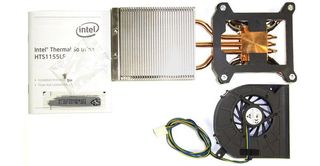Intel Launches New Reference Cooler for Small Form Factors
The HTS1155LP is the first model in Intel’s new series of reference coolers for small form factor PCs and is designed for ultra-thin desktops.

Small form factor computers have seen a dramatic increase in popularity over the past year. We fully expect this trend to continue with the increasing capability of Mini-ITX systems and the launch of Intel’s 3rd Generation NUC PCs. Consequently, it would seem that now is certainly an appropriate time for Intel to launch a new series of reference coolers that are tailored to the requirements of this form factor.
The first model in the series is the HTS1155LP, an “active solution” for ultra-thin desktops that is compatible with a wide range of H6x motherboards, including the Intel DH61AG. The cooler features a relatively small heat sink with three heat pipes that weigh 264 grams and measure 77 x 77 x 26 mm, and an 80 x 80 x 22 mm cooling fan that spins between 1180 RPM and 3380 RPM.
Intel hasn’t provided any pricing information on the HTS1155LP. We wouldn’t be surprised if the cooler will only be available to Intel’s partners or bundled with an appropriate ULV processor.
UPDATE: After further investigation (and help from a tipster), it turns out that the HTS1155LP has actually been on the market for more than two years. This being said, we were able to confirm with Intel that the cooler is compatible with Intel Intel's 4th Generation Processors up to a TDP of 65W.
Stay On the Cutting Edge: Get the Tom's Hardware Newsletter
Get Tom's Hardware's best news and in-depth reviews, straight to your inbox.
-
Someone Somewhere Wait - didn't they use this when they built that thin-ITX AIO a while back.Reply
Not new. -
Namisecond I guess the important thing is that it's becoming a new standard for desktop use. Very few of those laptop cooling solutions were usable on another board even by the same manufacturer. Thin mini-itx has similar problems with board compatibility.Reply -
Someone Somewhere Actually, the smaller the fan the higher the RPM has to be to get the same noise - tip velocity is the main factor.Reply
Think the maths is still somewhat different for centrifugal ones though.
Most Popular





